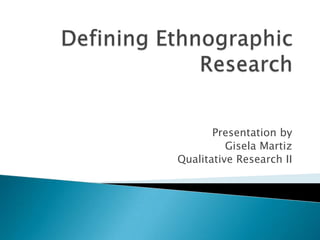
Defining Ethnographic Research
- 1. Presentation by Gisela Martiz Qualitative Research II
- 2. writing literary scientific Fiction Plain Rhetoric subjectivity Fact (true) objectivity (false) language
- 3. The new rhetoric makes two assumptions: All writing shares common rhetorical devices, and appeals to audience Each field has its own set of literary devices and rhetorical appeals “Science does not stand in opposition to rhetoric; it uses it” (Richardson, 1990,p.15). “Styles of writing science are not fixed or neutral but reflect the historically shifting domination of particular schools or paradigms” (p. 16). “Science writing is a socio-historical construction that is narratively driven and depends upon literary devices not just for adornment but cognitive meaning” (p.13).
- 4. Synecdoche- In quantitative research we study parts (sample) to represent a whole (population) Metaphors use theory as a building Metaphors organize social scientific work work and affect the interpretations of the facts (p.19)
- 5. What can we learn from the role of George Spindler in Wolcott‟s trajectory in ethnography and how does it relate to our research? “Don‟t generalize. The heart of ethnography is singularity” (Wolcott, 2010, p.17). “An ethnographer never generalizes to other cases. One might, in interpretation, compare specific other cases, or hypothesize about the broader scope of phenomena” (p.19).
- 6. How would ethnography fit within your research? What elements would make your research study an ethnography? How can ethnography help you achieve your research purposes?
- 7. Boundeness “…all studies are bounded, and the broader their boudnaries, the less use e can make of them to understand what is happening „on the ground‟” (p.36) Themes Themes are ways to put patterns of behavior together to get at the heart of the mattr, and that I the ethos of the culture” (p.39). Time Fieldwork takes time, writing it up takes longer than expected, and arriving at a satisfactory conclusion of what it all means may seem to take forever.
- 8. How should we write our research? Who is our audience…..(besides the dissertation committee, of course)?
- 9. 1. Richardson, L. (1990). Writing Strategies: Reaching Diverse Audiences. Thousand Oaks, CA: Sage Publications 2. Anyon, J. (Ed.) (2008) Theory and educational research: Toward critical social explanation. New York: Routledge 3. Wolcott, H. (2010). Ethnography Lessons: A primer. Walnut Creek, CA: Left Coast Press
